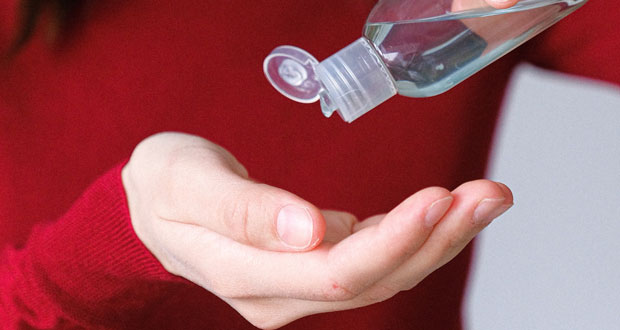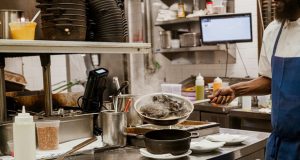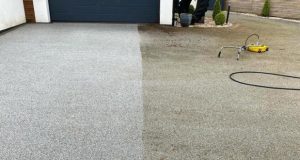 The alcohol-based hand sanitiser market has become awash with unregulated and potentially harmful products available to buy.
The alcohol-based hand sanitiser market has become awash with unregulated and potentially harmful products available to buy.
Here, Dr Huw Evans, Research & Development Director at Byotrol plc, an antimicrobial technology specialist, discusses the importance of researching the hygiene products used by professionals, to ensure they are safe and suitable for use.
It’s hard to believe that a year has passed since our supermarket shelves were left bare of essential items, with everyday cleaning products and hand sanitisers almost impossible to get hold of.
Now, 12 months on, cleaning and hygiene product manufacturers have continued to work tirelessly to ensure demand and supply are in equilibrium, to help limit the spread of Covid-19.
Throughout the pandemic, hand sanitisers in particular have remained a shopping a list staple for business owners, facilities managers and the average consumer. So much so that the Office for National Statistics’ consumer price index, which reviews the sales of popular goods to measure consumer inflation, added hand gel to its official list of goods in March this year.
But the huge and sudden demand for hand sanitisers last year, which saw sales increase a staggering 255 per cent when lockdown was first announced in March 2020, caused supply issues across the country. Constrained by factories in China not reopening after Chinese New Year, packaging became impossible to source, followed quickly by shortages of raw materials when European manufacturers were forced to shut down. Once the supply chain restabilised, the market was flooded with unregulated and untested alcohol sanitiser products as some new entrants to the industry sought to cash in on the obvious commercial opportunity.
Effective and safe biocidal products normally require months of continuous and rigorous development and testing before they are released to market. From developing the antimicrobial technologies and finished formulations, the stability in your chosen packaging, to the process of gaining regulatory approval, right through to testing market demand and ensuring correct and compliant labelling on pack – the steps involved in developing superior hygiene products are complex, and rightly so, as the risks associated with producing substandard products can be life-threatening.
But last year, we saw some of these steps regularly bypassed in a rush to get products into consumers hands – leading to a situation where potentially harmful goods were being sold to the public.
For instance, in October 2020, authorities in the Republic of Ireland had to recall more than 50 products, including hand sanitisers which contained harmful methanol instead of ethanol. Similar news stories about dangerous alcohol-based hand sanitiser products available on the market have unfortunately become all too common throughout the pandemic.
Sectors which had never used hand sanitiser before, such as the construction industry, quickly found that whilst they may be effective, alcohol hand gels had clear flammability risks for their teams on site – but without clear guidance from the government they knew little about the alternatives. The continued misconception around the need for hand sanitisers to contain alcohol in order to be effective against Coronavirus, resulted in a surge of these potentially harmful products and very little acknowledgement of the hand sanitisers which used alternative active ingredients and would therefore be more appropriate for environments where ignition sources are present.
We conducted our own research alongside YouGov into this confusion and found that nearly half of UK adults surveyed believed that alcohol-free hand sanitisers are not as effective as their alcohol-based counterparts. Only 15 per cent knew this was not the case, and the remaining were not sure.
There are several dangers associated with alcohol-based hand gels in general. The products are flammable and toxic if ingested. Research from the University of Oxford found that the number of poisoning incidents involving alcohol-based products in the first nine months of 2020 was more than double compared to 2019. For schools responding to the pandemic, trying to avoid further closures or absenteeism and searching for products to keep staff and pupils safe, alcohol-free hand sanitisers represent a clear advantage.
Consumer organisation Which? investigated and reported that many alcohol gels on the market didn’t have the requisite formula to be effective at killing bacteria and viruses, despite making a claim of greater than 60 per cent alcohol concentration on pack. The significant issues that this can cause during a pandemic is obvious.
There are several safe and highly effective alcohol-free hand sanitisers on the market. Our own hand sanitiser INVRTU, for example, contains no alcohol and has been dermatologically tested to ensure it doesn’t dry or sting hands. It has less risk of eye irritation and is far better suited to use by children, and also requires no compromise of religious beliefs – all while killing 99.99 per cent of viruses and harmful bacteria.
The reality is, our INVIRTU product went through months of testing before it was available for use by consumers. We developed multiple formulations before deciding on the most effective one, which then went through rigorous microbiology lab testing processes both internally at our headquarters in Chester and in external laboratories, followed by further independent dermatological testing. All of this means users of our products can be confident that the hand sanitiser they are using is safe and effective for use and that our claims on pack are justified.
Unfortunately, however, the ongoing confusion around alcohol contents in hand sanitiser means products that haven’t undergone similar testing processes are being widely used. While it’s commonplace to see large jerrycans of unlabelled hand gel at entrances to supermarkets, schools, places of worship and other public spaces, the public have no way to identify where a product is suitable for their skin, or even if it is effective.
Overcoming this confusion will be key as we begin to reopen offices and public spaces, so that we can use products that are safe for everyone.
One challenge is that this requires facilities managers and cleaning professionals to do deep research on the products they’re buying.
Unlike in Europe, the MHRA regulations state that any hand sanitiser which makes claims against Covid-19 or the transmission of the virus which causes it, needs to be licensed as a medicine to be sold in the UK.
This limits hand sanitiser manufacturers’ ability to be clear about the products efficacy against Covid-19 on bottles. Last year, the MHRA determined that 341 products on the UK market were making medicinal claims relating to Covid-19 and approached the 69 manufacturers to remove the claims from their marketing material.
We have been rigorously calling on Government to change these rules and the way in which hand sanitisers are regulated in the UK. But until those changes are made, the responsibilities will continue to fall on the professionals responsible for keeping our offices and public spaces clean and hygienic.
That’s why it’s absolutely vital to research the product you are buying and using, to ensure it’s been thoroughly tested and regulated, and is safe for public use.
The cleaning industry has an enormous role to play in reducing the spread of Covid-19 when the economy begins to reopen again and undergoing this due diligence in your product procurement process will only help with that.
To find out more about Byotrol’s INVIRTU alcohol-free hand sanitiser, visit: https://www.invirtu.co.uk/





